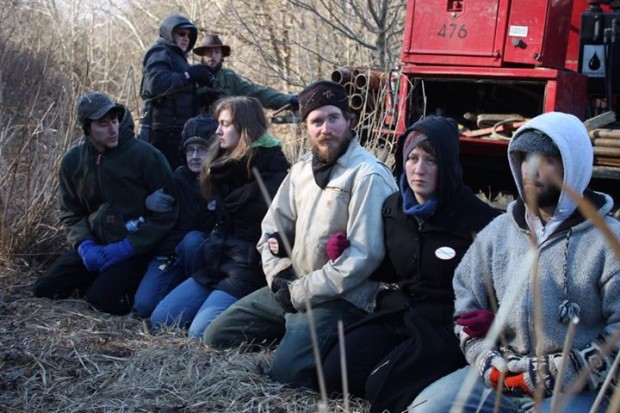Towns take on gas industry, at their own peril

COURTESY OF MICHELLE JOHNSEN
Protesters of the Atlantic Sunrise gas pipeline link arms before they are arrested in Conestoga, Pa in January. They later pleaded guilty to trespassing charges.
Local governments all over the country are trying stop the surge in oil and gas development by embracing a novel legal tactic–community-based rights ordinances. It’s a strategy that carries risks.
In rural Conestoga Township, Lancaster County concerned residents want to stop a $3 billion interstate gas pipeline from coming through their community. Oklahoma-based Williams Partners Atlantic Sunrise project is one many proposed pipelines in Pennsylvania facing intense opposition. If approved, it would cut through 10 counties and carry Marcellus Shale gas as far south as Alabama.
As Williams prepares its formal application for federal regulators, Conestoga Township residents are fighting for more local control.
“A direct challenge to existing law”
Conestoga resident Kim Kann fears her wooded lot will never be the same. As she looks out at the trees and horse paddock, she worries. Although she opposes the Atlantic Sunrise project, her land could be taken by eminent domain.
“We’ve used the land for horses and had goats over the years,” she says. “The kids 4-wheel and camp–all the things we thought they’d be able to do forever on a property like this.”
She knows the community rights ordinance is a long shot, because pipelines like this one are regulated by the federal government.
“We are pursuing it as a direct challenge to existing law.”
Late last year Conestoga Township’s supervisors unanimously rejected an ordinance to ban the pipeline. Their solicitor called it “ineffective” and “unenforceable.”
Many similar ordinances have been spearhead by a Franklin County-based nonprofit called the Community Environmental Legal Defense Fund (CELDF). They work with communities around the country. It’s part of a broader effort to fight corporate power and the notion of corporate personhood.
“It’s not a fracking problem. It’s a democracy problem,” says CELDF organizer Chad Nicholson. “The people most affected are not the ones that have the power to make decisions about how and when the activity takes place.”
In 2010 CELDF helped Pittsburgh become the first major U.S city to ban fracking. But it was a largely symbolic move that was never legally challenged, since no one wants to frack downtown Pittsburgh.
“Their approach doesn’t win cases”
More recently the group helped Mora County, New Mexico pass a similar ordinance. But in this case, it was sued. A federal judge recently sided with drillers. Now the poor, rural county may be on the hook for the industry’s legal fees.
Mora County Commissioner Paula Garcia (D) doesn’t support drilling. But she also opposed CELDF’s ordinance and has mixed feelings about the group’s tactics.
“They have a very powerful message, and they’re contributing to a very important movement,” she says of CELDF. “At the same time—from a pragmatic standpoint—their approach doesn’t win cases. Their approach doesn’t give us tools we can actually use.”
A judge in Ohio recently ruled against another CELDF inspired anti-drilling ordinance. The group began working on community-based rights ordinances in the early 2000’s. So far, they’ve helped write more than 160 across the country. According to Nicholson, none of CELDF’s ordinances have been upheld by appellate courts, because they haven’t made it there yet.
These efforts deliberately conflict with the reality of the legal structure—which often gives power to state and federal regulators. That’s why both industry and environmental observers see CELDF as more of a political movement than a sound legal strategy.
Feds feel pipeline pushback
But political action is gaining some ground. The anti-pipeline movement has not gone unnoticed in Washington D.C. Cheryl LaFleur heads the Federal Energy Regulatory commission (FERC), which oversees interstate pipelines.

AP Photo/Nati Harnik
Cheryl LaFleur heads the Federal Energy Regulatory Commission, which oversees interstate gas pipelines.
“These groups are active in every FERC docket,” she says. “As well as in my email inbox seven days a week, in my Twitter feed, at our open meetings, and literally at our door.”
Last summer protesters were arrested for blocking the entrances to FERC’s offices.
LaFleur recently spoke to the National Press Club and said people will need to learn to live with new development.
“I think that our nation is going to have to grapple with our acceptance of gas generation and gas pipelines if we expect to achieve our climate and environmental goals.”
But many pipeline opponents feel FERC isn’t listening and simply rubber-stamps projects. For example, Williams has never had FERC say ‘no’ to its pipelines, but the company has withdrawn applications.
Opponents argue the pipelines won’t serve the public good and much of the gas is destined for overseas markets. That’s part of the reason people like Kim Kann are backing community rights ordinances.
“We haven’t found anything else that has any teeth to it,” says Kann.
But Williams Partners spokesman Chris Stockton says the ordinances don’t have any teeth.
“We are regulated by the federal government,” he says. “As a result, we are exempt from a lot of those local ordinances.”
The company is moving forward with plans to file a formal application with FERC. Meanwhile, people in Conestoga Township are pushing a ballot initiative so they can move forward with adopting an anti-pipeline ordinance.
















